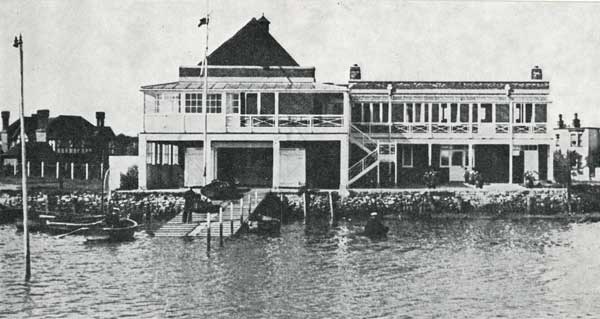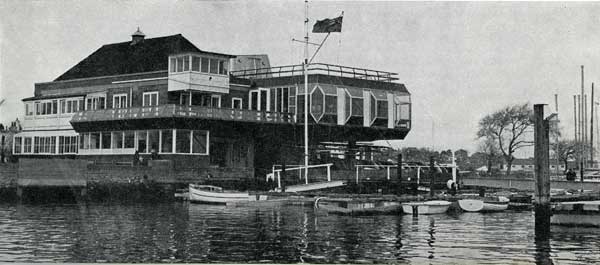The New Club House
 The Clubhouse in the 30s
The Clubhouse in the 30s
In 1946 the Club's interests widened, the premises remaining open throughout
the winter for
lectures. For the first time, too, a Club Bulletin, which is very much alive
today, was prepared by
Gilbert Hackforth-Jones, the author.
Considerable improvements were made to the bar in 1947 by a volunteer gang
of club members,
the ganger-in-charge being the Vice-Commodore. It is interesting that in
1946 Samuel Cook
prepared drawings illustrating that additional accommodation could be
constructed above the
north-south wing by the erection of a Mansard roof-structure. Roger Pinckney
also submitted a
similar scheme. These plans were of particular interest for future
consideration and Samuel Cook
apparently made provision for this additional loading when designing the
north-south wing.
The pressure of membership demanded expansion of the premises and, during
1957, a generous
response was made by members towards a fund to enable improvements to be
made to the Club
Rooms, the Reading Room being the first to receive attention. Two additional
windows were
introduced; the fire-place surround was remodelled with its flanking
bookcase, new curtains and a
complete redecoration.
In 1958/59 a new wine store was built on the site of the old lavatory which
permitted the extension of the bar counter and the introduction of a comer
at the west end of the bar, where there was a fireplace. It was for this enclosure that Jean Cobb designed and executed the
beautiful etched panel
which we still have with us. Roy Coombs also painted a fair-scene of yachts
on Lymington River
which provided a delightful feature for the bar.
Improvements to the Changing Rooms were carried out in 1960 when the Race
Officer's Box
was erected above the old enclosure. The original concrete slipway of the
last century was in such
good condition that it became one of the principal supports for the new
columns existing today.
'Feeding the Brute' had always been a conundrum and, with the ever-increasing
membership, the
difficulty was accentuated. Mercifully, the advent of the admirable Mr.
Brooks and his catering staff
resolved the problem, but there were still no facilities.
In March 1963, Frank Webster was asked to prepare drawings illustrating
improvements to the
club building, plans which included providing a kitchen on the first floor.
The improvements were
completed by March, 1964, without interfering with the use of the club.
In 1966, anticipating a maximum membership of 2,400, the Club decided
finally to modernise the
premises and to take full advantage of the magnificent view of the river and
its estuary. A new pontoon
was provided to replace the old waterfront and now 100 feet of deep water is
available alongside.
The reconstruction was completed in 1968. Our present Club is the happy
result.



